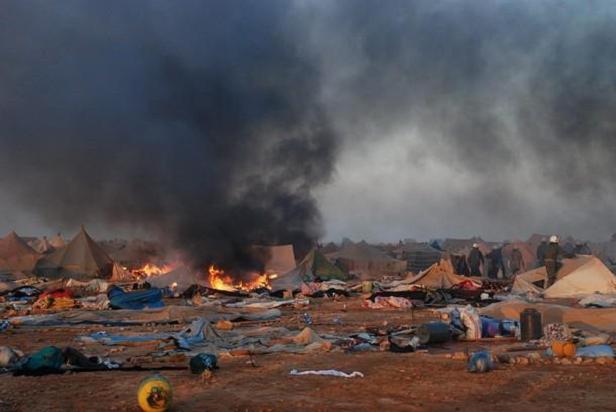If there was one subject all the Saharawis I met in Laayoune wanted to talk about, it was Gudaym Izik (Gdeim Izik) – the protest camp set up in November 2010.
‘I was in the first group,’ explained Ali Salem, a veteran activist in his forties. ‘We went to an area called Gudaym Izik (Gdeim Izik), twelve kilometres to the east of the city, and set up a camp. At first there were thirty-five tents, but over the days it grew. People came out from Laayoune to join us and we had 20,000 by the peak in 6,600 tents. We called it our ‘Exodus’ camp, it was a protest against the social marginalisation and the lack of decent jobs, decent housing, legal rights. But it became something more than that – people came to the camp to go back to their roots, back to what being a Saharawi is about. We wanted to show the world we can live on our own, we can live away from civilisation, we belong to the desert.
 |
| Gdeim Izik protest camp on Nov 5, 2010. Photo by Tenerife con el Sáhara |
‘It was like a utopia,’ said his friend Mohammed. ‘Rich and poor joined in, people from different cities, young and old.’
‘They tried to do the same in other cities,’ said Ali, ‘in Dakhla, Smara, Goulmime, but the police arrested them, harassed them, took them to prison. But Moroccans who were living here, and also some Saharawi bloodsuckers who’ve benefitted from the system, were anxious. They saw a young generation who wouldn’t let them carry on benefitting from our resources. So one morning at 5 am the people in the camp were woken by the sound of helicopters and voices telling them in Hassaniya: ‘You can go home now, your complaints are being answered.’ Then the forces moved in, they burned the tents and destroyed equipment, people started panicking. They chased people, beat them up, especially the young ones. Or they told them, ‘come in the van, we’ll take you back to Laayoune’ – and instead they took them to prison.’
 |
| Destruction of the protest camp by Moroccan authorities on Nov 17, 2010. Photo by Ceasefire Magazine |

No comments:
Post a Comment